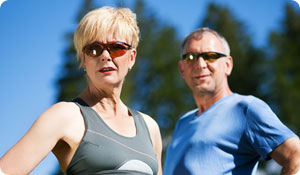
Which is better: running on full or running on empty? We're talking about the fuel you put in your body. There's a lot of confusion about eating and exercise. Some studies say you'll burn more fat if you exercise on an empty stomach. Others assert your athletic performance will suffer if you don't fuel it with the right food. Who's right? Well, both. Read on for more information about eating and exercise.
Empty Stomach
A study performed by researchers at the University of Birmingham suggests that exercising on an empty stomach is a good way to trim the fat. That's because muscles usually get energy from carbohydrates. If no carbs are available, they'll burn fat for fuel.
Researchers tested this theory by assigning several people to cycle three days per week, followed by an intense session an hour later, on an empty stomach. Another group of cyclists followed the same exercise routine, but didn't fast beforehand. The hungry cyclists turned in a worse performance than the fed cyclists, but burned a higher proportion of fat to carbohydrates.
Many athletes say that eating before a workout makes them feel slow, heavy, and even nauseous. This is especially true when they engaged in "stomach-jostling" activities like running or soccer. Does that mean exercising on an empty stomach is better? Not necessarily.
Full Stomach
Many athletes and fitness trainers believe in carbo-loading before an important athletic event because the quality of the fuel they put into the body impacts the quality of the athletic performance. That's true, to some extent. Food only becomes fuel and (therefore, usable energy) after it has been digested by the stomach and absorbed through the intestines. It takes at least an hour (and usually several hours) to break down food into fuel.
Eating several hours before exercising is probably your body's best bet for maximizing energy, stamina, and athletic performance. That's because your food has recently been converted to available energy. But what if you're a first-thing-in-the-morning exerciser and don't have time to eat three hours earlier? Fitness experts recommend grabbing an easily digestible snack to fuel your workout without weighing you down. Choose toast and peanut butter, or fruit and yogurt. The combination of carbs, protein, and fiber will supply you with a gradual release of energy. Avoid "quick carbs" like juice or candy. They'll pick your blood sugar up, but you'll also burn those calories quickly, which might give you a "sugar dive" halfway through your workout.
So which is better: empty or full? That depends on why you're exercising. Is it to become a better athlete or to lose weight? That leads to further questions about the quality and duration of your exercise session on a full versus empty stomach. That might require some personal research. Experiment with how your feel when you exercise hungry or full. Most people find they do their best when their stomach is somewhere in the middle.
Sources:
Australian Institute of Sport
Eating Before Exercise
http://www.ausport.gov.au/ais/nutrition/factsheets/competition_and_training2/eating_before_exercise





